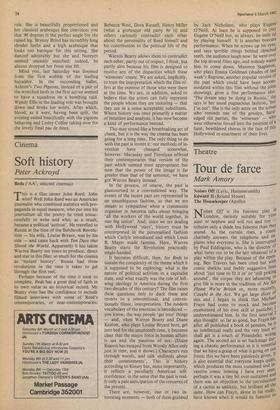Cinema
Soft history
Peter Ackroyd
Reds ('AA', selected cinemas) This is a film about John Reed.. John who? Well John Reed was an American journalist who combined statistics with pro- paganda in equal measure, who put into his journalism all the poetry he tried unsuc- cessfully to write and who, as a result, became a political 'activist'. He travelled to Russia at the time of the Bolshevik Revolu- tion ŌĆö his wife, Louise Bryant, was by his side ŌĆö and came back with Ten Days that Shook the World. Apparently it has taken Warren Beatty ten years to produce, direct and star in this film: so much for the cinema as 'instant history'. Russia had three revolutions in the time it takes to get through the first reel.
Perhaps because of the time it took to complete, Reds has a great deal of faith in its own value as an historical record. Mr Beatty even has the confidence to include filmed interviews with some of Reed's contemporaries, or near-contemporaries: Rebecca West, Dora Russell, Henry Miller (what a grotesque old party he is) and others variously contradict each other about the personality of Reed himself and his contribution to the political life of the period.
Warren Beatty allows them to contradict each other, partly out of respect, I think, but partly also because his film is designed to resolve any of the disparities which these 'witnesses' create. We are asked, implicitly, to trust the interpretation which the film of- fers at the expense of those who were there at the time. We are, in addition, asked to believe that the actors can fully represent the people whom they are imitating ŌĆö that they are in a sense acceptable substitutes. Where history was once primarily a matter of intuition and analysis, it has now become a kind of performance instead.
This may sound like a breathtaking act of cheek, but it is the way the cinema has been going for a long time. The only thing to do with the past is invent it: our methods of in- vention have changed somewhat, however. Macaulay and Trevelyan offered their contemporaries that version of the past which seemed most appropriate; but now that the power of the image is far greater than thaf of the sentence, we have got Warren Beatty instead.
In the process, of course, the past is glamourised in a conventional way. The events of the recent past are represented in an unambiguous fashion, so that we are meant to sympathise when a communist organiser in America talks about bringing 'all the workers of the world together, in one big union'. And, since we are dealing with Hollywood 'stars', history must be reinterpreted in the personalised fashion which Carlyle introduced and which Louis B. Mayer made famous. Here, Warren Beatty starts the Revolution practically single-handed.
It becomes difficult, then, for Reds to sustain the complexity of the theme which it is supposed to be exploring: what is the nature of political activism in a capitalist state, and what exactly was the role of left- wing ideology in America during the first two decades of this century? The film raises these questions only to duck them and reverts to a conventional, and conven- tionally filmic, interpretation. The modern vocabulary of the emotions is introduced you know, the way people 'get into' things ŌĆö and, when Warren Beatty and Diane Keaton, who plays Louise Bryant here, get into bed for the umpteenth time, it becomes clear that the major force in human affairs is sex and the passions of sex. (Diane Keaton has escaped from Woody Allen only just in time, and it shows.) Characters run through woods, and talk endlessly about their commitments', This is history according to Kinsey but, more importantly, it reflects a peculiarly American self- confidence: in the sense that the past is real- ly only a pale anticipation of the concerns of the present.
There are, however, one or two in- teresting moments ŌĆö both of them grabbed
by Jack Nicholson, who plays Eugene O'Neill. At least he is supposed to play Eugene O'Neill but, as always, he ends up by playing himself. It is another bravura performance. When he screws up his eyes, and says terrible things behind clenched teeth, the audience laugh now: he went over the top several films ago, and nobody wants him to come down. Maureen Stapleton, who plays Emma Goldman (shades of last week's Ragtime, another popular version of the past which could have been accom- modated within this film without the joins showing), gives a fine performance also. 'The dream may be dying in Russia,' she says in her usual pugnacious fashion, 'but I'm not'. She is the only actor on the screen who reminds one of the gossipy, hard- edged old parties, the 'witnesses' ŌĆö who were otherwise forced into the position of a faint, bewildered chorus in the face of this Hollywood re-enactment of their lives.






































 Previous page
Previous page